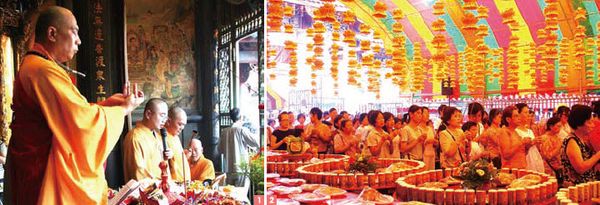The Chinese Festival of Ghosts - Zhongyuan Festival
Ghost Festival – Caring for Lonely Ghosts In an effort to centralize the burning of ceremonial spirit money and reduce the amount of pollution caused, the city's Dept. of Civil Affairs, Dept. of Cultural Affairs, and Dept. of Environmental Protection cooperate in the staging of consolidated Zhongyuan Pudu activities at Huiji Temple in the Zhishanyan neighborhood. From 2:30 pm in the afternoon on the first day of the seventh month to the same time on the first day of the eighth month, hundred-year-old Pudu rites are faithfully carried out here. The detailed Pudu regimen includes ceremonial “opening of the tomb gates,”decoration of water lanterns, sacrificial offerings, and“closing of the tomb gates.” The rites carried out at Taipei's Longshan Temple are heavy in tradition. Before Pudu is celebrated, a lantern pole well over ten meters tall is erected before the temple and a traditional decorated lantern hung upon it. This serves as a beacon for lonely ghosts moving about, which are often given the more peaceful name “good brothers”. There is also a water lantern rite to attract water ghosts. In many places a gupeng is also put up, a high canopy under which donors compete to lay out the best feast foods for the otherworldly visitors. The banquet includes the traditional“five types of meat”—pork, chicken, duck, fish, and internal organ such as pork liver or tripe—symbolizing all the animals of the world. Also on the ghostly banquet table are steamed rice, rice-based dishes, and other goodies. Pudu literally means“universal ferrying,”and in one saying after the rites have been carried out and the sins of the ghosts expiated—the ghosts“ferried”to salvation—mortal folk in the crowd are invited, often at the sound of a gong, to take what foods they like. This is called qianggu, and those lucky enough to get their hands on some of the goodies will be blessed with good fortune in the year to come. Grand rites are also staged in celebration of the Zhongyuan Festival over at Guandu Temple, north Taiwan's oldest temple dedicated to Mazu, the Goddess of the Sea. The Pudu is nigh, and all those interested in learning about and seeing live Taiwan's ageold folk traditions associated with the“universal ferrying”have a key site close at hand. Add: 211, Guangzhou St. Add: 26, Lane 326, Sec. 2, Zhicheng Rd. Add: 61, Hami St. Add: 360, Zhixing Rd.
In the Chinese lunar calendar, the 15th day of the 7th month marks the traditional Zhongyuan Festival , which most folk simply call the Ghost Festival. On this day the Gates of Hell are wide open and ghosts arrive en masse in the mortal world, a time where many decide it is best not to go outside, thus avoiding “bumping into a ghost”. In Taiwan Ghost Month runs through the entire seventh lunar month, the Gates of Hell open the entire time, with many traditional taboos in force, among them: don't get married, buy a house, renovate, go on a trip, have an operation. Under no circumstances do you go swimming or stand close enough to water that you can stumble and fall in, for“water ghosts” lurk beneath, looking for substitute bodies so they may return to the mortal world.
According to tradition, the Gates of Hell are swung open on the first day of the seventh lunar month, ghosts visit the mortal world in number on the fifteenth day, and the gates swung shut again on the last day. When the gates are opened, what are called“lonely ghosts” come to visit the mortal world; these are ghosts that do not have family carrying out rites for them, so members of the public will carry out what are called Pudu rites to give them succor. Those carrying out private rites will place tables outside their doors laden with such offerings as cooked dishes, cakes, and pastries. A single incense stick will be inserted into each offering. The public rites, which are also called the Zhongyuan Ceremony, are carried out at local temples, generally staged by clans of specified surnames that have long lived in a neighborhood.
Universal Ferrying for the Hungry Ghosts – A Manifestation of Love
The wonderfully ornate Dalongdong Bao'an Temple has an especial ly wel l -at tended Ullambana Ceremony each year. In the morning, there is a“Water Repentance Service”, with chanting of scripture and an enlightening talk from a Buddhist master that cleanses and purifies the soul of onlookers and instils an emotional calmness and tranquility. In the afternoon comes the“Feeding of the Hungry Ghosts”, with a grand feast laid out and the ghosts consuming the“essence”of the foods. During the rites, a papier-mache likeness of the Pudu Gong (Master Who Helps the Crossing) is set up, then cremated at ceremony's end to symbolize its consummation. The folk-art traditions followed in the creation of the icon have been handed down for countless generations.
Information Longshan Temple
Huiji Temple
Tel: (02)2302-5162
Dalongdong Bao'an Temple
Tel: (02) 2831-5656
Guandu Temple
Tel: (02)2595-1676
Tel: (02) 2858-1281

![Taiwan.gov.tw [ open a new window]](/images/egov.png)
